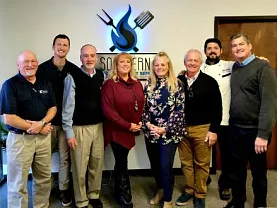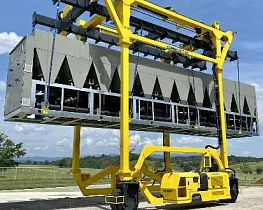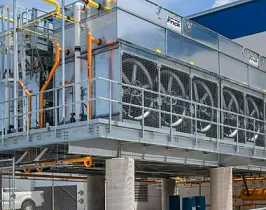
Empowering Next Generation Data Centers with High Performance Chip Cooling Solutions: Rittal HPC Cooled-by-ZutaCore solutions provide trusted global expertise with innovative waterless two-phase direct contact evaporative liquid cooling.
Rittal, a leading global system provider of IT infrastructure as well as industrial solutions and ZutaCore, a waterless, two-phase, liquid cooling company, have announced a strategic partnership. Together they offer highly efficient data center cooling solutions and will enable customers to cool processors up to and above 900W. Now data center owners and operators can harness computer power at significantly higher densities from the CPU level through to server, rack and data center levels.
The global data center liquid cooling market is expected to grow from USD 1.2 billion in 2019 to USD 3.2 billion by 2024, at a Compound Annual Growth Rate (CAGR) of near 25 percent during the forecast period (MarketsandMarkets) . With the growth of applications, such as artificial intelligence and machine learning, data center decision makers need a cooling platform that will meet and surpass the challenges of high-powered processors. Rittal HPC Cooled-by-ZutaCore addresses that opportunity head on and can be adopted confidently and quickly, to go beyond the limits of air and eliminate the use of water.
“Data center owners are very interested in liquid cooling solutions as a way to manage new high-performance workloads that are disruptive to the rest of the data center environment. However, many are hesitant to introduce new technologies into their environments – especially those that introduce liquids adjacent to their mission-critical electronics. The partnership between long-time and trusted data center provider Rittal and ZutaCore will alleviate hesitations to adoption and open up opportunities for much greater efficiencies in data center cooling,” says Jennifer Cooke, Research Director for IDC's Cloud to Edge Datacenter Trends and Strategies team at IDC.
“ZutaCore is a dynamic partner with a depth of expertise in liquid cooling technology. Combining this pioneering two-phase cooling technology with our scalable IT racks and cooling systems will create a data center revolution at a global scale," states Dr. Thomas Steffen, Managing Director Research & Development, Rittal. “As energy efficiency requirements increase upwards of 400W in CPUs and GPUs, it is critical that we can offer solutions that will grow with the customers in order to manage the heat, and other requirements over time,” added Dr Steffen.
As a leading global system provider, Rittal is prepared to accommodate the most diverse requirements across industries and has established itself as a major player in data center cooling. Incorporating ZutaCore’s solution into its platform recognizes the complementary LCP technol-ogies. Together they can alleviate cooling boundaries from hot spots to the edge, consistently, in any climate. The unique benefits of waterless liquid cooling are critical to achieving unparalleled heat dissipation while mitigating the risk of IT failure.
“This marks a major milestone for ZutaCore as we partner with a global leader in end-to-end solutions for innovative IT environments – from edge to hyperscale computing,” says Erez Freibach, co-founder & CEO at ZutaCore. “This partnership will bring tremendous value to data centers globally as customers can now rely on trusted integrated solutions from Rittal embedding advanced, waterless liquid cooling from ZutaCore to densify data centers, decrease complexity, and lower costs. By partnering with Rittal, we are ready to change the dialog and get to the heart of the growing demand to provide effective cooling solutions from the rack to complete data centers worldwide.”
Representatives from Rittal and ZutaCore will attend the 2020 OCP Global Summit from March 4-5 at the San Jose Convention Center. At booth number B9 visitors can view an interactive demo and learn more about their joint product pipeline, how they are addressing demands from hyperscale and colocation companies, and a future strategy for scaling to continue to provide flexible solutions for both new and retrofit projects.



